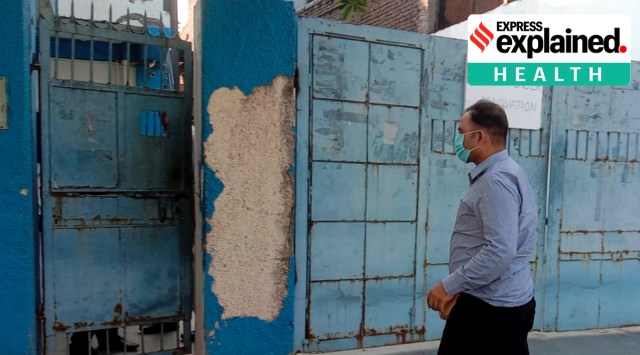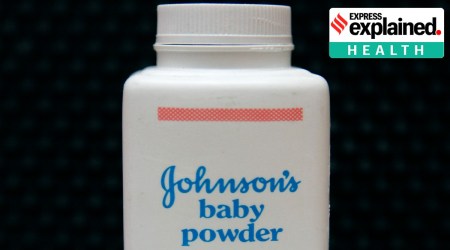India-made cough syrups and deaths in Gambia: what we know so far
The Centre has set up a committee to look into a report by the World Health Organisation about four Indian-manufactured cough syrups that could have caused 66 deaths in Gambia. What do we know about the cough syrups? Are they sold in India? Should you be worried?
 A health department official arrives at the Maiden Pharmaceuticals Ltd unit in Sonipat, Thursday, Oct. 6, 2022. (PTI Photo)
A health department official arrives at the Maiden Pharmaceuticals Ltd unit in Sonipat, Thursday, Oct. 6, 2022. (PTI Photo)The Indian government Wednesday (October 12) set up a committee of four experts to examine a report by the World Health Organization (WHO), which said four Indian-manufactured cough syrups could potentially be linked to acute kidney injury in children and 66 deaths in the small West African nation of The Gambia.
The syrups — Promethazine Oral Solution, Kofexmalin Baby Cough Syrup, Makoff Baby Cough Syrup, and Magrip N Cold Syrup — were manufactured by Maiden Pharmaceuticals, based in Sonipat, Haryana.
Following the WHO’s report, the Haryana government has ordered a “complete stop” on production of the cough syrups.
What happened in The Gambia?
At the end of July, the country’s Epidemiology and Disease Control Department was informed of a “sudden” increase in cases of children ages 5 months-4 years reporting to hospital with acute kidney injury. By August, 32 cases and 28 deaths had been reported — a case fatality ratio at 87.5 per cent — local media quoted the Ministry of Health as saying.
In a press release issued in early August, the Edward Francis Small Teaching Hospital, the biggest in the country, said: “There is a rare condition currently under observation in paediatric outpatient. Samples were collected from the affected children and awaiting results from the lab. Our doctors are working very hard to establish the cause of the condition.”
In September, The Gambia reported the four syrups, used for fever, cough, and allergic cold, to the WHO. In its alert, the WHO said laboratory analysis of samples of each of these products had confirmed the presence of “unacceptable amounts of diethylene glycol and ethylene glycol as contaminants”.
The Gambia initiated a nationwide recall of the syrups on October 5, beginning with three of the worst-affected regions.
What do diethylene glycol and ethylene glycol do?
Both are chemical contaminants that may be present in the solvent that is used in the syrups. It is toxic to humans, and can result in abdominal pain, vomiting, diarrhoea, inability to pass urine, headache, and altered mental state. It can also lead to acute kidney injury that may be fatal in children. In 2020, 17 children died in Jammu and Kashmir after consuming a syrup with high levels of diethylene glycol.
 Maiden Pharmaceuticals Limited factory in Sonepat district, Thursday, Oct. 6, 2022. (PTI Photo)
Maiden Pharmaceuticals Limited factory in Sonepat district, Thursday, Oct. 6, 2022. (PTI Photo)
Should you be worried?
No. The four medicines were manufactured by the Haryana-based company only for export to The Gambia. “These 04 drugs are not licensed for manufacture and sale in India. In effect, none of these four drugs is sold domestically,” the Union Health Ministry has said in a release.
According to an official, the company had taken special permission to make the medicines with specifications of the export country in mind after receiving a purchase order.
Why are the syrups not sold in India?
A drug regulatory expert who was part of the investigation into the 2020 J&K deaths said India has phased out syrups in favour of suspensions.
In syrup, the active pharmaceutical ingredient (API) is completely mixed in the solvent — imagine a sugar solution. In a suspension, on the other hand, API particles are suspended uniformly in a solvent — imagine cooked dal.
“That is why it says on labels on the bottles, ‘shake well before use’, otherwise the API will settle at the bottom,” the expert said.
APIs such as paracetamol and others contained in the four syrups are not water-soluble, and hence need a base solvent like propylene glycol. “Propylene glycol is available in two varieties — one type is meant for industrial use, the other for pharmaceutical use. To save on costs, some companies use the industrial propylene glycol that may contain diethylene glycol and ethylene glycol as contaminants,” the expert said.
Suspensions do not need propylene glycol as the active ingredient does not have to be dissolved. They use a liquid base called carboxymethylcellulose (CMC), with no risk of containing the two contaminants.
What are the Indian authorities doing?
After being informed about the incident on September 29, India’s apex regulatory body, Central Drugs Standard Control Organisation (CDSCO), along with the state authorities, opened investigations and lifted control samples — from the same batch of syrups — which are being tested in a Chandigarh-based lab.
Should the control samples be found to contain high levels of contaminants, “proportionate action will be taken against the company, which may include suspension of the licence to export the drug”, an official had said. “However, we are unsure whether we can initiate criminal action because the deaths did not happen in India,” the official added.
Pharmaceutical expert C M Gulhati said it is the responsibility of the importing country to test medicines before releasing them in their market. “India tests what is imported… If Indian authorities start testing all the drugs that the country exports, then that is all they will be doing,” Gulhati said.
The Health Ministry has asked the WHO to share a report on causal relationship — confirmation that the syrups led to the deaths in The Gambia — at the earliest. “The exact one to one causal relation of death has not yet been provided by WHO to CDSCO. As a robust National Regulatory Authority, CDSCO has requested WHO to share at the earliest with CDSCO the report on establishment of causal relation to death with the medical products in question,” an official release said.







































